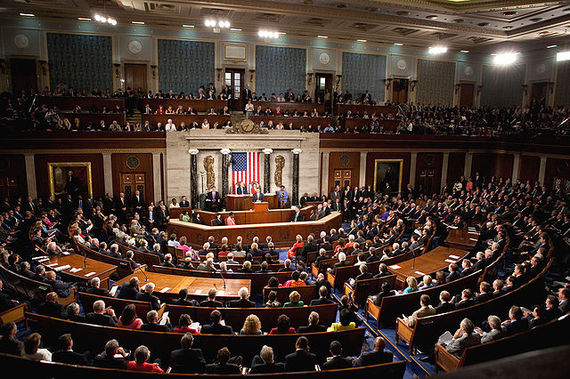In an earlier blog post, "The Stupid Party? Which One?" I looked into the worrisome issue of the Republican Party being hijacked by anti-science Luddites. But what about the House of Representatives? So I spent a day putting together a spreadsheet on the 435 members of the House in the 113th Congress, their backgrounds, and how they have voted on a few important (to me!) science bills.
U.S. House of Representatives
Who Are These Folks?
Yep, they are mostly Republican (234 to 199), with 109 members (all Republican) affiliated with the Tea Party Caucus, according to Wikipedia. They are very young. While 33 congressmen have been in office for 25 years or more, 175 have been there for fewer than five years. They are also dominated by liberals. According to rankings by conservatives.org, 107 members rate over 80 percent in their voting for conservative bills, while 170 are liberal and vote fewer than 20 percent of the time for conservative bills. In terms of careers, the House is dominated by lawyers and businessmen (73 percent), with Republicans dominating business (86 to 28), and lawyers being equally split between Republicans and Democrats (85 to 87). In terms of education, 369 members attended colleges and universities included in the U.S. News rankings for National Universities, National Liberal Arts Colleges and Regional Colleges and Universities. Of these, 246 are national institutions (e.g., Princeton University), 58 are liberal-arts colleges (e.g., Swarthmore College), and 65 are regional colleges (e.g., Taylor University). In each group, about half of the congressional attendees are Republican and half are Democrats.
So What Is All This Talk About Anti-Science?
Half of the 234 Republican congressmen have been classified as climate-change deniers (CCDs). This group of 116 members is exclusively Republican. CCDs contain only 60 of the 109 Tea Party Caucus members, so even the vocal tea party does not think in lockstep about this issue.
We can also check the bipartisan League of Conservation Voters' environmental scorecard for CCD congressmen. Their median score is 7 percent, which is identical for Tea Party Caucus members and the Republican congressmen as a whole. They all vote to support very few environmental bills. Democrats, by comparison, have a median score of 90 percent.
One other surprising discovery among the 116 CCDs is that they are not at all "stupid" but have attended many of the same prestigious top-ranked universities as non-deniers. Sixty-eight attended nationally ranked undergraduate institutions, 14 attended liberal-arts colleges and 19 attended regional colleges. In terms of careers, only about 25 percent of lawyers and businessmen are CCDs. This matches national Pew surveys of the general public, which indicate that about 30 percent of the public are CCDs.
Other Non-Climate-Science Voting
Both Republicans and Democrats are bullish about science. H.R. 4660, which gave the NSF a 3-percent budget increase, was passed by 204 Republicans and 117 Democrats. H.R. 3547 increased the budget for NIH and was passed by 201 Republicans and 175 Democrats. The NASA Reauthorization Bill, H.R. 4412, was passed by a vote of 218 Republicans and 183 Democrats to refund this agency in Fiscal Year 2014 and even slightly increase its budget.
However, just below the surface of this overwhelming bipartisan support for science is, again, a dispute over climate change. House Amendment 1045 was a bill to specifically deny funding for the Department of Energy's Climate Model Development and Validation Program. This amendment was passed 226 to 194 along party lines. Meanwhile, H.R. 4808, the Clean Air Act Amendment, was recently introduced on June 5 by Republican Congressman Mark Kelly and would prohibit the EPA from regulating carbon dioxide as a greenhouse gas pollutant. Stay tuned!
So What Does This All Mean?
Climate change is very definitely a wedge issue between Republicans and Democrats like no other recent science issue about which bills have been written and voted upon. Yet, despite what you might think, both Democrats and Republicans consistently come together when votes on scientific research are involved. There is no downside to this support, because it always creates new jobs and business opportunities. The problem is that climate change is widely perceived as a brake on the economy requiring fearsome federal regulations and very long-term commitments beyond the political horizon. Republicans consistently vote for fewer environmentally friendly bills compared with Democrats. But when it comes to medical research, space exploration and all other basic research issues, Republicans and Democrats are reading from exactly the same page and both support science enthusiastically. Who, after all, can refuse funding medical research to save lives, basic research to innovate new technologies for commercial markets, and the inspiring spectacle of space exploration?
But before we allow our congressmen to pat themselves on the head for American bipartisan support of scientific research, both parties have been complicit in the decline of federal science funding as a fraction of GDP by nearly 60 percent from 1967 to 2007, and the dismal and pathetic underfunding of cancer research since 2003, which I pointed out in my earlier blog post " Our Shamefully Wimpy War on Cancer."
Even without climate change as an issue, our politicians are still collectively headed in the wrong direction when it comes to medical research, which directly benefits all of us, and maintaining our scientific edge as a nation, which lays the groundwork for our future.
CORRECTION: An earlier version of this post erroneously identified U.S. Reps. David Price (D-North Carolina), Alcee Hastings (D-Florida), and Bob Brady (D-Pennsylvania) as climate-change deniers. In fact, all three congressmen accept the scientific consensus that climate change is real and that human activities are its primary driver. The post has been updated accordingly. We regret the error.
